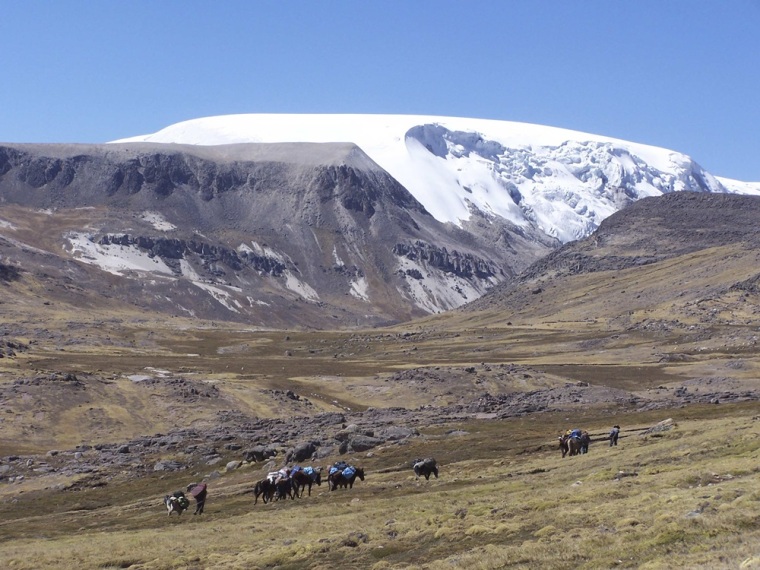Climate Change Latest News 2015: Spanish Conquistadors Started Climate Change in Americas 100s Years Before Industrial Revolution – Study

Climate change likely started hundreds of years before the Industrial Revolution as suggested in a recent study conducted by researchers from Ohio State University.
A study on the Quelccaya ice cap in Peru published in Proceedings of the National Academy of Sciences on Monday shows that the mining activities of Spanish conquistadors, with their "lust for precious metals," pumped trace elements and contributed to the change in the climate of the Americas, Fox News Latino reported
In exploring the history of mining and metallurgy in the region between 793 and 1989, Paolo Gabrielli of Ohio State University and other researchers measured the various trace elements, such as lead, bismuth, and arsenic, that were released into the atmosphere during extraction and refining of metals and then deposited in the core of the Quelccaya glacier.
They found that a spike in trace element levels occurred around 1480, the time when the Incas started expanding their empire and used bismuth deposits to make a new type of bronze alloy. However, the period following the Spanish conquest of the Inca empire in 1533 recorded a huge increase in chromium, molybdenum, antimony, and lead levels that was not surpassed until the industrial revolution.
"The metallurgic activities of the Inca had most likely only a local impact on the environment surrounding their mining operations," said Gabrielli, a study author and research scientist at the Byrd Polar and Climate Research Center at Ohio State. "In contrast, the mining and metallurgic activities performed by the Spanish had an impact on the atmosphere of the entire South America continent," Gabrielli said.
The levels started going up until 1700 and stayed steady until around 1830, coinciding with the wars of independence in Spanish America, Fox News Latino said.
During that time, "rebel and royalist armies destroyed machinery, killed draft animals, and damaged mines and refineries," the study said, as reported by Smithsonian Magazine.
"In addition, the scarcity of both [mercury] and labor for amalgamation, lack of transportation infrastructure, dearth of capital, and debilitating fiscal policies all contributed to stagnation in the mining industry during this time," the study said.
The new research also suggested that the Anthropocene – the proposed epoch that began when human activities had a significant global impact on the Earth's ecosystems – started earlier than the Industrial Revolution. With lead being found in Greenland ice cores, some researchers said the period begun as far back as the Greek, Roman and Medieval periods.
"This new epoch emerged discontinuously through space and time during human history," Gabrielli said. "In other words, our data challenge the concept of the onset of the Anthropocene as a synchronous global discontinuity in the global geological record."
 Christians don't have to affirm transgenderism, but they can’t express that view at work: tribunal
Christians don't have to affirm transgenderism, but they can’t express that view at work: tribunal Archaeology discovery: Medieval Christian prayer beads found on Holy Island
Archaeology discovery: Medieval Christian prayer beads found on Holy Island Presbyterian Church in America votes to leave National Association of Evangelicals
Presbyterian Church in America votes to leave National Association of Evangelicals Over 50 killed in 'vile and satanic' attack at Nigerian church on Pentecost Sunday
Over 50 killed in 'vile and satanic' attack at Nigerian church on Pentecost Sunday Ukrainian Orthodox Church severs ties with Moscow over Patriarch Kirill's support for Putin's war
Ukrainian Orthodox Church severs ties with Moscow over Patriarch Kirill's support for Putin's war Islamic State kills 20 Nigerian Christians as revenge for US airstrike
Islamic State kills 20 Nigerian Christians as revenge for US airstrike Man who served 33 years in prison for murder leads inmates to Christ
Man who served 33 years in prison for murder leads inmates to Christ


 Nigerian student beaten to death, body burned over ‘blasphemous’ WhatsApp message
Nigerian student beaten to death, body burned over ‘blasphemous’ WhatsApp message 'A new low': World reacts after Hong Kong arrests 90-year-old Cardinal Joseph Zen
'A new low': World reacts after Hong Kong arrests 90-year-old Cardinal Joseph Zen Iran sentences Christian man to 10 years in prison for hosting house church worship gathering
Iran sentences Christian man to 10 years in prison for hosting house church worship gathering French Guyana: Pastor shot dead, church set on fire after meeting delegation of Evangelicals
French Guyana: Pastor shot dead, church set on fire after meeting delegation of Evangelicals ‘Talking Jesus’ report finds only 6% of UK adults identify as practicing Christians
‘Talking Jesus’ report finds only 6% of UK adults identify as practicing Christians Mission Eurasia ministry center blown up in Ukraine, hundreds of Bibles destroyed: 'God will provide'
Mission Eurasia ministry center blown up in Ukraine, hundreds of Bibles destroyed: 'God will provide' Church holds service for first time after ISIS desecrated it 8 years ago
Church holds service for first time after ISIS desecrated it 8 years ago Burger King apologizes for 'offensive campaign' using Jesus' words at the Last Supper
Burger King apologizes for 'offensive campaign' using Jesus' words at the Last Supper Uganda: Muslims abduct teacher, burn him inside mosque for praying in Christ’s name
Uganda: Muslims abduct teacher, burn him inside mosque for praying in Christ’s name